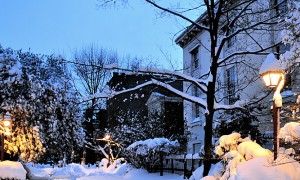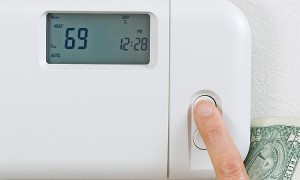It’s winter, you’re cold, and the best thing to do seems to be to turn up the heat. Then you get your natural gas or electric bill and regret attempting to keep your home heated to 72 degrees. Improving the energy efficiency of your home does two things. It helps a house stay toasty and warm through the winter, and it reduces the amount of energy you use to do that, in turn reducing your energy costs. If you’re tired of wrapping up in blankets in an effort to keep your energy bills down, here are a few ways you can make your home more efficient.
Get Audited
A home energy audit is an ideal tool if you want to figure out exactly what your home’s issues are. Both the Philadelphia Gas Works and PECO, the electric company, offer auditing programs. PGW’s program involves having a professional auditor come to your home to determine what areas can be improved to save you money each month and to reduce the amount of natural gas you use. For example, he or she might recommend replacing your furnace or heating system, improving insulation, and better sealing your home. The program is currently available for $150. Plus, you’ll receive rebates on the cost of any improvements you end up making to improve your home’s energy efficiency.
The program from PECO includes both an online e-audit and an at-home, in person assessment or audit. You’ll want the PECO program if your home uses electric heat, not gas. The energy audit costs $100 and examines how you’re using electricity, as well as diagnostic tests to determine if there are any air leaks in your home.
Seal Things Up
One of the big reasons why your Philadelphia home might feel so chilly in the winter, even if you have the heat turned up, is that all the warm air is escaping. Air leaks are often found around doors, windows, and outlets, as well as in the basement or attic, if you have one. If you have an energy audit performed, the auditor will most likely use a large fan or blower to locate any leaks.
You can also spot leaks yourself by looking at the window or door during the daytime. If you can see light seeping in through the edges of the door or window, air is also likely to be seeping through. If the window or door feels loose in its frame, you’ve likely got a leak. You can seal those leaks yourself with weatherstripping or caulk, or hire a professional to do it for you.
Get with the Program
According to the U.S. Department of Energy, installing a programmable thermostat can save you up to 10 percent each year on the cost of your home’s energy. When you have a programmable thermostat, you don’t have to worry about forgetting to turn down the heat when you leave the house for work or go to bed in the evening, as it will automatically do it for you. Most thermostats have an override feature, too, so you can skip turning down the heat on days when you’ll be home, without turning off the program for the rest of the week.
It doesn’t take much to improve the energy efficiency of your home, once you’ve figured out the source of the problem. While you can fix things yourself, the energy auditing programs in Philly are inexpensive enough that it might make sense to bring in the pros.
Image Source: Flickr/Justin Wolfe
[cf]skyword_tracking_tag[/cf]






